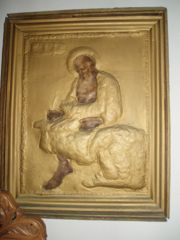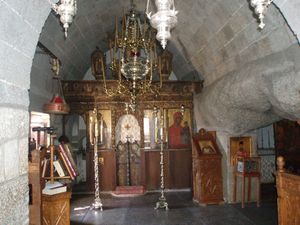Difference between revisions of "Apostle John"
m |
|||
| (One intermediate revision by one other user not shown) | |||
| Line 20: | Line 20: | ||
*[[Rock of Kynops (Patmos)|Rock of Kynops]] | *[[Rock of Kynops (Patmos)|Rock of Kynops]] | ||
*[[Baptistry of John (Patmos)|Baptistry of John]] | *[[Baptistry of John (Patmos)|Baptistry of John]] | ||
| + | *[[Missionary]] | ||
==Hymns== | ==Hymns== | ||
| Line 48: | Line 49: | ||
*[http://www.copticchurch.net/synaxarium/5_4.html#1 The Departure of St. John the Evangelist and Theologian] (Coptic) | *[http://www.copticchurch.net/synaxarium/5_4.html#1 The Departure of St. John the Evangelist and Theologian] (Coptic) | ||
*[http://explorepatmos.com/patmos/Monasteries/Cave_of_the_Apocalypse/ Cave of the Apocalypse] | *[http://explorepatmos.com/patmos/Monasteries/Cave_of_the_Apocalypse/ Cave of the Apocalypse] | ||
| − | |||
[[Category:Biblical Saints|John]] | [[Category:Biblical Saints|John]] | ||
Latest revision as of 13:22, June 17, 2020
The holy, glorious and all-laudable Apostle and Evangelist John (also John the Theologian or John the Divine) was one of the original twelve Apostles, and wrote the Gospel bearing his name; three canonical letters: I John, II John, and III John; and the Book of Revelation. His primary feast day is celebrated on May 8, that of the twelve apostles on June 30, and his repose on September 26. His symbol is the eagle.
St. John was the son of Salome the myrrh-bearer and Zebedee, a fisherman. His brother was St. James, another apostle.
In his own Gospel account, he refers to himself as "the disciple whom Jesus loved" rather than use his name. He was the youngest of the twelve apostles, and especially close to the Lord. This closeness is often portrayed in icons of the mystical supper, where St. John leans on Jesus.
He was present for the Transfiguration of Christ with Peter and his brother James.
St. John was exiled to the island of Patmos by Emperor Domitian around 90-95 A.D., and it was there that he received and wrote the Book of Revelation.
"Account of the miracle that occurred at his grave: When over 100 years old, St. John took seven disciples outside of Ephesus and had them dig a grave in the shape of a cross. St. John then went into the grave, and the disciples buried him there, alive. Later on, when his grave was opened, St. John's body was not there. 'On May 8 of each year, dust rises up from his grave, by which the sick are healed of various diseases.' " [1]
See also
Hymns
There is an akathist hymn dedicated to him.
- Beloved apostle of Christ our God,
- hasten to deliver a defenseless people.
- He who allowed you to recline on His breast,
- receives you as you bow before Him.
- Implore Him, John the Theologian,
- to disperse the persistent threat from the heathens,
- entreating for us peace and great mercy.
Kontakion (Tone 2)
- Who shall declare declare your greatness,
- O virgin disciple,
- for you pour forth wonders and are a source of healings,
- and pray for our souls as Theologian and friend of Christ.
External links
- Holy Apostle and Evangelist John the Theologian (OCA)
- Repose of the Holy Apostle and Evangelist John the Theologian (OCA)
- John the Apostle, Evangelist, and Theologian (GOARCH)
- The Falling Asleep of St. John the Evangelist and Theologian (GOARCH)
- The Commemoration of St. John The Evangelist (Coptic)
- The Departure of St. John the Evangelist and Theologian (Coptic)
- Cave of the Apocalypse
Categories > Church History
Categories > Church History
Categories > Church History
Categories > Liturgics > Feasts
Categories > Liturgics > Feasts
Categories > Liturgics > Feasts
Categories > People > Saints
Categories > People > Saints > Biblical Saints
Categories > People > Saints > Saints by century > 1st-century saints


